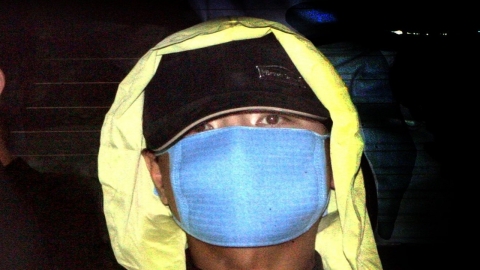■ Starring: Airport staff YTN Disaster Specialist
* The text below may differ from the actual broadcast content, so please check the broadcast for more accurate information. Please specify [YTN New Square 10AM] when quoting.
[Anchor]
It's cloudy since the morning. Although the direct impact of Typhoon Kongrey has been avoided, very strong rain and wind are expected mainly in the south. After the weekend, winter begins in earnest. We will forecast the weather in detail with YTN Disaster Specialist, Airportjin. You're out, right?
[Airport Jin]
Hello,
[Anchor]
How are you? Since the first day of November, the whole country has been cloudy, but first of all, Seoul and the metropolitan area are cloudy and cloudy. It is said that there is strong rain and wind in the south, is this the effect of Typhoon Kongrey?
[Airport Jin]
It's November, and you must have been very nervous to hear about the typhoon, but fortunately, there will be no direct impact from the typhoon. However, although the typhoon is weakening, there are many rain clouds in front of the typhoon. And since the typhoon's rain clouds are gradually approaching the south of Korea, I am worried that it will rain a lot. Especially now, the rain has already started. That's why Jeju Island received more than 50mm of rain today alone. Currently, rain of around 10mm per hour is pouring out. Areas that are likely to receive a lot of rain will be close to the rain clouds brought by the typhoon, that is, Jeju and southern regions. It will mainly rain in the southern part of the country until tomorrow morning. Jeju Island is expected to have strong rain until tomorrow afternoon. The problem is that the amount of rain is likely to be large. Heavy rain of up to 300mm is expected in the mountainous areas of Jeju Island. 80 to 150mm in other Jeju areas. With this amount of rain, it's hard to prevent autumn rain ahead of winter, and it's pouring like summer rain.
Rainfall of up to 80 to 100mm is also predicted in the southern part of the country until tomorrow morning. Fall leaves fall in fall these days. There is a possibility that these fallen leaves will block the flow of water, so you should prepare in advance. I'm especially worried because it's night when it rains the hardest. A heavy rain warning has already been issued in Jeju today. There is a possibility of a heavy rain warning on the southern coast, so we should be careful and careful about the mountain areas of Jeju Island, Jeju Island, the southern coast of Gyeongnam, and the southern coast of Jeollanam-do, where very strong rain is expected tonight.
[Anchor]
As you said, Korea does not have a direct impact on Kong-rey, but Taiwan, where Kong-rey swept away. There were a lot of casualties and a lot of damage. But why did your power weaken as you came up?
[Airport Jin]
Typhoon Kong-rey was a big typhoon that developed into a very strong typhoon with a speed of more than 200 kilometers per hour. So Taiwan, where this typhoon directly affected, suffered a lot of damage, and it weakened a lot as it passed through Taiwan. It is maintaining moderate power now, but it is getting weaker and weaker, so it is expected to end its life as a typhoon by tomorrow morning or early morning. However, even if the typhoon weakens, there is strong wind, so you need to prepare for it, but the reason why the typhoon suddenly weakens is that in order for the typhoon to maintain its power, a strong rotation must continue.
However, as this rotation landed in Taiwan, friction with the ground, and there were many mountainous areas there, so it can be said that the hovering was broken when it hit the mountain. And the other thing is that typhoons need to continue to receive energy in order to maintain their power, and where they receive this energy supply is from the hot sea. The sea surface temperature should be high, but the sea surface temperature of the Taiwan Strait, where the typhoon escaped, and between China and Taiwan, the sea surface temperature is not that high. That's why it's hard to get energy because it's not as high as summer. So, it can be said that the typhoon has rapidly weakened because it has not received energy, the typhoon has been circling a lot, and the vortex has been broken.
[Anchor]
As you said, the wind is quite strong, so what areas should I be careful about?
[Airport Jin]
When a typhoon rises, the right side of the typhoon is called the danger zone. On the right side of the typhoon, strong east wind winds come in, and this wind is often strengthened. So even if a typhoon turns into a temperate low pressure, it is expected to be on the right side of the typhoon, the right side of the typhoon area, that is, the southern coast and the east coast in Korea, and strong winds are expected in these areas. Until tomorrow, typhoon-like strong winds are expected to continue on Jeju Island, so signs and roofs that are not fixed well may be torn off. So, we need to be careful of secondary damage caused by facilities blown by this wind. A strong wind warning is also expected.
And on the southern coast, it is instantaneously 15m per second. It is difficult to walk when the wind blows more than 15m. Therefore, it is expected that such a sudden gust of wind will continue on the southern coast, so thorough preparation is necessary. In particular, if strong winds blow, there is a possibility that the takeoff and landing of the aircraft will be hindered. So, it's less likely that the wind blows in the direction of the plane's rise or fall, but it's very dangerous if the wind blows strongly on the side of the plane's rise and fall. Therefore, strong winds may hinder the takeoff and landing of aircraft, so those who use the airport should check in advance.
[Anchor]
I think you need to prepare for those in dangerous areas.
[Airport Jin]
It's the weekend, so you'll have to check it even more.
[Anchor]
I see. I heard that it will continue to rain until tomorrow. How is the weather over the weekend?
[Airport Jin]
As I told you earlier, rain is expected until tomorrow, but it does not rain on weekends in the Seoul metropolitan area. On the weekend, it is expected to be sunny and the temperature will be as high as the average year, so relatively warm weather is expected until the weekend, but you should be careful because the wind is strong until tomorrow. However, the southern part of the country has a rain forecast until tomorrow morning and Jeju Island has a rain forecast until tomorrow afternoon, so it is necessary to prepare for the rain, especially Gangwon-do, which will receive the east wind, and it is expected to rain again tomorrow. It seems that there will be heavy rain from time to time, so there are people who will visit the east for autumn leaves, but until tomorrow, we need to prepare for strong winds and rain. On Sunday, as the weather recovers little by little, the weather is likely to improve and the wind is likely to calm down little by little. However, since rain is not predicted on the weekend in the metropolitan area, outdoor events are not expected to be canceled or anything like that.
[Anchor]
But I heard that the winter cold will begin in earnest next week. It's better to prepare for visiting Korea in advance on the weekend. What do you think?
[Airport Jin]
I know. After the rain stops, cold air is expected to come from the northwest, which is the coldest air this fall. Therefore, the temperature is expected to drop from Monday afternoon, after the weekend, and on Tuesday morning, the lowest temperature in Seoul is 3 degrees. So, if the wind blows strongly, the wind chill will drop close to zero. On Tuesday morning, Paju, Yeoncheon, eastern Gyeonggi Province, northern Gyeonggi Province, and inland Gangwon Province are expected to fall below zero. Daegwallyeong is expected to be minus 4 degrees Celsius. That's why this cold is the coldest this fall. It is expected to feel a little bit of winter.
However, the temperature is expected to rise a little more than expected yesterday. So, the effects of cold air are not expected to last that long. However, anyway, very cold weather continues for about three days on Tuesday, Wednesday, and Thursday. And the impact on the body is expected to be significant because the hot weather these days has continued to be higher than usual rather than hot. So I think it would be better to prepare for winter.
[Anchor]
There are a lot of people who are curious about the winter weather. According to the Korea Meteorological Administration's three-month forecast, hot or cold weather is repeated alternately, so why is this?
[Airport Jin]
First of all, if you look at the data released by the Korea Meteorological Administration through its long-term outlook, it is currently available until December and January. In December, temperatures are likely to be similar or lower than normal, and in January, temperatures are more likely to be similar or higher than normal. So in a way, you can see it as a jump. So, it is expected that the temperature will suddenly rise and then fall again, but since the temperature is a little lower than usual in December, the cold below zero is expected to come often. Of course, January is higher than usual, but there is a possibility of a flash cold wave falling below minus 15 degrees Celsius. So, it is generally high and generally low, but it is unlikely that the cold will continue or the weather will continue to be higher than usual. In short, it can be expected that the temperature change is likely to be extreme in winter.
The reason why such fluctuations in temperature are expected is that the climate pattern surrounding Korea is clear, and there has been a certain pattern of flow in the meantime, but it continues to collapse. In particular, this year's weather is as hot as last year's, and the sea surface temperature is especially high. So, the reason why we can predict that the temperature is higher than the average year is that if the inflow of southern air is higher than the average year, and the reason why we can predict that Korea is colder than the average year is that if the cold air coming down from the north is likely to affect our country. However, in this case, it is more difficult to predict because there is no clear movement to predict. So, in a nutshell, there are extreme temperature changes this winter. When it's cold, it's very cold, and if it's not, it's likely that the cold will be relieved and this phenomenon will continue. I think it would be better to prepare for both cases. This phenomenon is expected to continue for the time being as the Earth is expected to continue to show abnormalities in the future, so it is expected that this phenomenon will continue for the time being, and accordingly, it will be necessary to prepare more thoroughly.
[Anchor]
Let's stop here. I made a weather forecast with YTN disaster expert at the airport. Thank you.
[Airport Jin]
Have a nice day.
※ 'Your report becomes news'
[Kakao Talk] YTN Search and Add Channel
[Phone] 02-398-8585
[Mail] social@ytn. co. kr
[Copyright holder (c) YTN Unauthorized reproduction, redistribution and use of AI data prohibited]
Weather
More- [Weather] Rain and wind in the southern part of Jeju Island...a cool autumn in the north-central part of the country
- [Weather] 'Heavy rain and strong wind warning' Jeju is up to 300mm by tomorrow...South Coast 100mm
- Heavy rain with gusts of wind on Jeju and the South Coast until tomorrow morning...Up to 300mm
- [Weather] Until tomorrow, Jeju, South Coast, rain and wind...Next week is winter cold?




![[Site Y] "A match with spontaneity"..."I'm a Singer," a busking trip that hasn't happened before (comprehensive)](https://image.ytn.co.kr/general/jpg/2024/1101/202411011235575627_h.jpg)
![[Y scene] Baby Monster makes a comeback in the music industry with 'DRIP' amid G-Dragon's support (Roundup)](https://image.ytn.co.kr/general/jpg/2024/1101/202411011231211529_h.jpg)
![[Site Y] Baby Monster "Surprised by GD's Participation in Composition..."Are you serious?"](https://image.ytn.co.kr/general/jpg/2024/1101/202411011156135797_h.jpg)

![[Game View] Indie's solidity...'KiwiWorks and Team Tetrapod' to compete with IP expansion](https://image.ytn.co.kr/general/jpg/2024/1031/202410311654017541_h.jpg)
